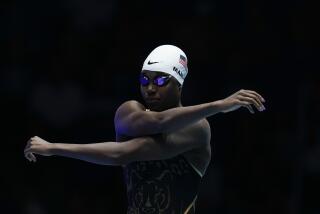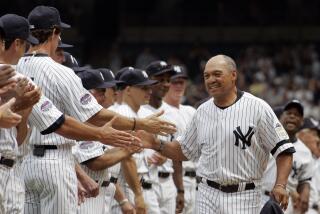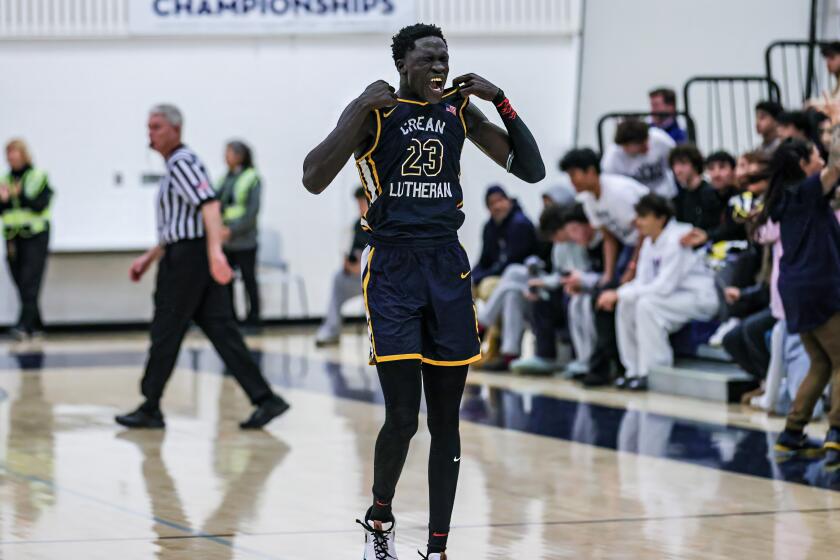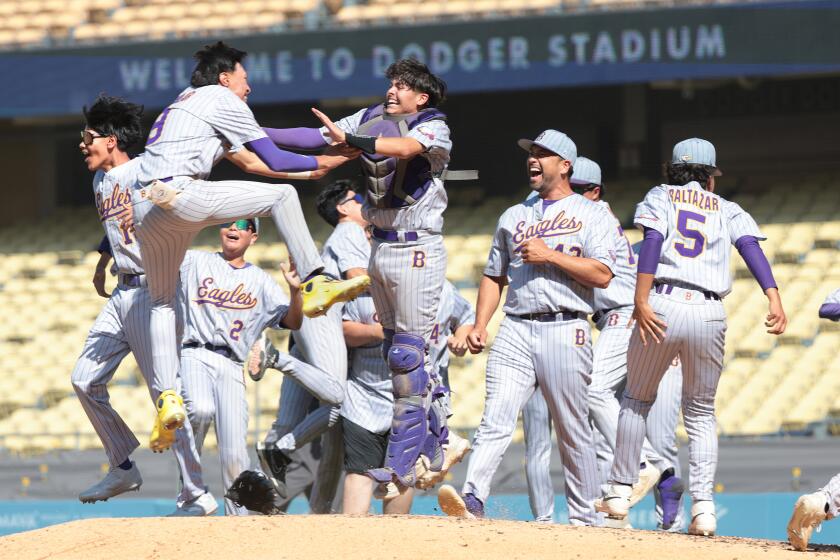PLAYING CATCH-UP
- Share via
Had Chicago Cub first baseman Derrek Lee not passed Albert Pujols near the end of this year’s fan balloting, there would not have been an African American starter in baseball’s All-Star game for the first time since 1948.
And of the 64 All-Stars who suited up Tuesday, only five were black Americans; Angel outfielder Garret Anderson, New York Yankee outfielder Gary Sheffield, Philadelphia shortstop Jimmy Rollins and Florida Marlin pitcher Dontrelle Willis were the others.
That means the percentage of African American stars was even worse than the paltry 9% throughout the major leagues.
As recently as 1994, the starting six outfielders in the All-Star game all were black Americans -- Barry Bonds, Joe Carter, Ken Griffey Jr., Tony Gwynn, David Justice and Kirby Puckett. However, the number of African Americans on major league rosters has been steadily declining for decades.
But now there is hope that a young nucleus of up-and-comers, all high draft picks in the last few years, can reverse the trend.
Remember the names Prince Fielder, B.J. Upton, Justin Upton, Delmon Young and Rickie Weeks.
Fielder, a Milwaukee Brewer prospect, is the son of former Detroit Tiger slugger Cecil Fielder. Tagging around with his dad, Prince grew up around major league clubhouses and emulated another power hitter -- Frank Thomas of the Chicago White Sox -- while taking batting practice in Tiger Stadium as a child.
Yet baseball wasn’t Fielder’s first sport of choice. Or his second.
“I wasn’t that serious about baseball when I was younger,” said Fielder, who is playing for the triple-A Nashville Sounds after a three-week stint with the Brewers. “Watching baseball on television was kind of boring. Basketball and football were more exciting and faster paced.”
Fielder’s mentality reflects the attitude of many American-born black youths in urban communities, where the nostalgic image of Willie Mays playing stickball in the streets has been replaced with thoughts of gridiron glory and hoop dreams.
Now that Fielder has had a taste of the big leagues, he hopes to have a part in restoring interest in the black community back to America’s national pastime.
Fielder was taken by the Brewers with the seventh overall pick in 2002, the same year the Tampa Bay Devil Rays selected B.J. Upton, currently a shortstop with the triple-A Durham Bulls, with the second pick. Young and Weeks were picked one-two overall by the Devil Rays and Brewers in the 2003 draft.
Justin Upton, a shortstop from Virginia and B.J.’s younger brother, was the top overall pick in this year’s draft by the Arizona Diamondbacks.
Young, Weeks and Fielder were rated in the top 15 of this year’s Baseball America Top Prospect list. The trio, along with B.J., were members of last year’s Futures All-Star game in Houston.
“When young African Americans see us doing good and having fun, it will turn the outlook of baseball around and have it more of a sport for African Americans,” said Fielder, a left-handed first baseman.
Their potential breakthrough comes at a time when the percentage of blacks in baseball has dropped by two-thirds, from 27% in 1964, according to a recent report by the Institute of Diversity and Ethics in Sports at the University of Central Florida.
“By them doing well, it will definitely help the game,” said Richard Lapchick, chair of the DeVos Sport Business Program. “But the erosion has been so dramatic that it’s going to take more to restore interest in the urban community. These players could be part of that solution.”
There are no clear cut reasons for the decline of American blacks in baseball, however theories suggest economics as a factor. Where it costs about $100 to buy a relatively low-priced set of baseball gear, a $20 basketball can satisfy up to 10 players.
“For everyone who wants to play baseball, they know that it costs a lot,” said Young, an outfielder with the double-A Montgomery Biscuits. “It’s a lot tougher than playing basketball or football.”
Baseball lacks the cultural influence that basketball and football has in connecting with black youths, according to Dr. Todd Boyd, a critical studies professor at USC.
“I think obviously there’s been a long tradition of black superstars in the game,” he said. “Bonds has been one of the top players for the past decade and Willis is one of the top players right now. Because of that, there will always be a fair number of black players in the game. But I don’t think four or five new black superstars can overturn the influence that basketball has already had.”
Young said that basketball and football’s marketing attract black youth more than baseball’s.
“When Michael Vick and Allen Iverson have shoes out there and Dontrelle Willis doesn’t, it’s different marketing,” he said. “Baseball has a cleaner image. Basketball and football portray where black kids come from.”
Weeks said that he is excited about helping to usher black youths to the game, however he shouldn’t be looked upon to shoulder the burden alone.
“There’s been times when I have helped to run clinics and got out there,” Weeks said. “It’s something I really want to do in the upcoming years.”
Weeks, a second baseman currently with the Brewers, and Fielder both connected for their first home runs against the Minnesota Twins on June 25.
“That felt real good,” Weeks said. “Me and him grew up in the minor leagues together. For us to do it on the same night made it that much more special.”
The decline of blacks in baseball extends from the grass roots up, as more than 90% of youth baseball parks are located in suburban areas.
This year, only 4.5% of college players were black, a figure experts attribute to rules that cap scholarships at 11.7 even though roster sizes are often 30 players or more. As a result, few baseball players have full scholarships, whereas basketball and football programs are able to offer far more financial aid per player.
Among the quintet of prospects, Weeks is the only to have played in college. He was not drafted out of high school and enrolled at Southern University, where he twice led the nation in batting average.
“Not only did I mature as a baseball player, I matured as a man,” Weeks said.
All five have had relatives who were drafted to play pro baseball.
“It was a big deal,” said Young, whose older brother, Dmitri, is a first baseman for the Detroit Tigers. “He was the only one of my relatives to play baseball.”
With black stars either retired (Gwynn, Ozzie Smith, Puckett) or in the twilight of their careers (Bonds, Griffey Jr., Thomas), the ability to connect with big-name players is an issue in urban communities.
Such is the case in Los Angeles, once a bastion for talented black players, where children once saw the likes of Gwynn, Eric Davis, Eddie Murray, Smith and Darryl Strawberry coming out of the area.
“We have a lot of stars at the end of their careers and a lot of stars and semi-stars in the game now,” said Jacqueline Parkes, baseball’s senior vice president of advertising and marketing.
John Young, a former scout and founder of the RBI, Reviving Baseball in Inner Cities, concedes that black youths need more players to look up to.
“When Sheffield was in Los Angeles, it did a lot for the black community,” said Young, whose program’s alumni include big leaguers Willis, Carl Crawford and Coco Crisp. “The kids loved Gary and it was so important for them to see him out there.”
Major League Baseball has sought to rejuvenate interest by donating millions of dollars to RBI and the Little League Baseball Urban Initiative and helping to build the Youth Baseball Academy in Compton. Including Justin Upton, a record 31 RBI participants were taken in this year’s draft.
By the time he reaches the major leagues, Delmon Young hopes to see more blacks join him.
“It’ll be nice because we’ll all have something in common,” he said. “Right now, I only have two black teammates. It would be nice to have six or seven.”
*
(BEGIN TEXT OF INFOBOX)
Downward trend
One way to look at the decline of black athletes in baseball is to look at the number of black athletes who were born in the United States and made All-Star game rosters this year compared to 1995 and 1985.
2005
* NATIONAL (3): Derrek Lee, Jimmy Rollins, Dontrelle Willis
* AMERICAN (2): Garret Anderson, Gary Sheffield
1995
* NATIONAL (9): Barry Bonds, Bobby Bonilla, Ron Gant, Tony Gwynn, Barry Larkin, Fred McGriff, Reggie Sanders, Heathcliff Slocumb, Ozzie Smith
* AMERICAN (7): Albert Belle, Ken Griffey Jr., Kenny Lofton, Kirby Puckett, Lee Smith. Frank Thomas, Mo Vaughn
1985
* NATIONAL (8): Dwight Gooden, Tony Gwynn, Willie McGee, Dave Parker, Tim Raines, Ozzie Smith, Darryl Strawberry, Garry Templeton
* AMERICAN (10): Harold Baines, Phil Bradley, Cecil Cooper, Rickey Henderson, Donnie Moore, Eddie Murray, Jim Rice, Gary Ward, Lou Whitaker, Dave Winfield
Source: Los Angeles Times
More to Read
Go beyond the scoreboard
Get the latest on L.A.'s teams in the daily Sports Report newsletter.
You may occasionally receive promotional content from the Los Angeles Times.










